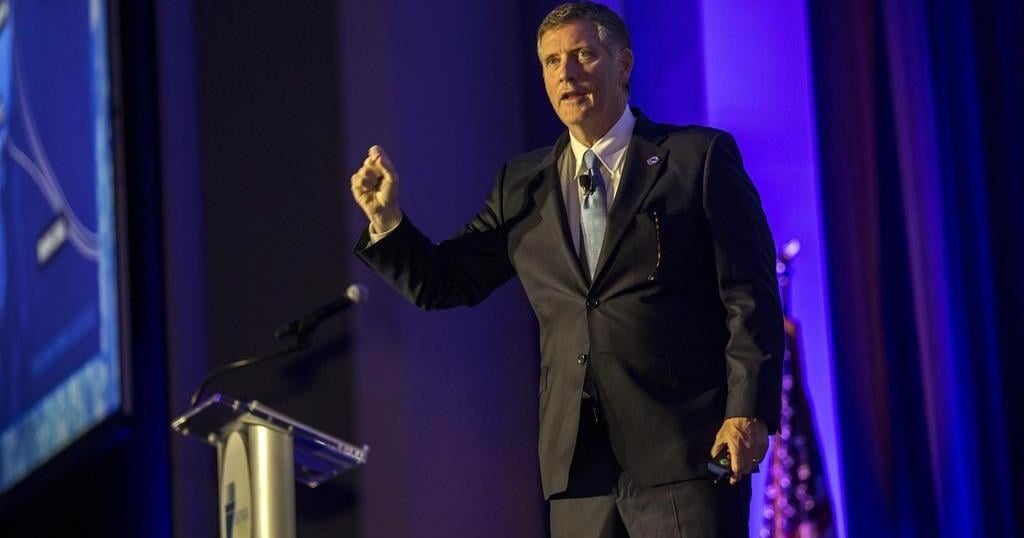PHILADELPHIA (AP) — Dockworkers at ports from Maine to Texas began walking picket lines early Tuesday in a strike over wages and automation that could reignite inflation and cause shortages of goods if it goes on more than a few weeks.
The contract between the ports and about 45,000 members of the International Longshoremen’s Association expired at midnight, and even though progress was reported in talks on Monday, the workers went on strike. The strike affecting 36 ports is the first by the union since 1977.
Workers began picketing at the Port of Philadelphia shortly after midnight, walking in a circle at a rail crossing outside the port and chanting “No work without a fair contract.”
The union had message boards on the side of a truck reading: “Automation Hurts Families: ILA Stands For Job Protection.”
The U.S. Maritime Alliance, which represents the ports, said Monday evening that both sides had moved off of their previous wage offers, but when picket lines went up just after midnight, it was apparent that no deal had been reached.
The union’s opening offer in the talks was for a 77% pay raise over the six-year life of the contract, with President Harold Daggett saying it’s necessary to make up for inflation and years of small raises. ILA members make a base salary of about $81,000 per year, but some can pull in over $200,000 annually with large amounts of overtime.
But Monday evening, the alliance said it had increased its offer to 50% raises over six years, and it pledged to keep limits on automation in place from the old contract. The union wants a complete ban on automation. It wasn’t clear just how far apart both sides are.
“We are hopeful that this could allow us to fully resume collective bargaining around the other outstanding issues in an effort to reach an agreement,” the alliance statement said.
The union didn’t answer requests for comment on the talks Monday night, but said earlier in the day that the ports had refused demands for a fair contract and the alliance seemed intent on a strike. The two sides had not held formal negotiations since June.
The alliance said its offer tripled employer contributions to retirement plans and strengthened health care options.
During the day Monday, some ports already were preparing for a strike. The Port of Virginia, for instance, was in the process of ceasing operations. It accepted the last inbound train for delivery at 8 a.m., closed its gates to inbound trucks at noon and required ships to leave by 1 p.m. Cargo operations halted at 6 p.m.
“We are handling this just like we would during the ramp up to a possible hurricane,” Joe Harris, the port’s spokesperson, told The Associated Press. “And we will bring it back online just as we would recovering from a hurricane. We have an experienced team. We’ve done this in the past.”
Supply chain experts say consumers won’t see an immediate impact from the strike because most retailers stocked up on goods, moving ahead shipments of holiday gift items.
But if it goes more than a few weeks, a work stoppage would significantly snarl the nation’s supply chain, potentially leading to higher prices and delays in goods reaching households and businesses.
If drawn out, the strike will force businesses to pay shippers for delays and cause some goods to arrive late for peak holiday shopping season — potentially impacting delivery of anything from toys or artificial Christmas trees to cars, coffee and fruit.
The strike will likely have an almost immediate impact on supplies of perishable imports like bananas, for example. The ports affected by the strike handle 3.8 million metric tons of bananas each year, or 75% of the nation’s supply, according to the American Farm Bureau Federation.
It also could snarl exports from East Coast ports and create traffic jams at ports on the West Coast, where workers are represented by a different union. Railroads say they can ramp up to carry more freight from the West Coast, but analysts say they can’t make up the cargo handled to the east.
“If the strikes go ahead, they will cause enormous delays across the supply chain, a ripple effect which will no doubt roll into 2025 and cause chaos across the industry,” noted Jay Dhokia, founder of supply chain management and logistics firm Pro3PL.
J.P. Morgan estimated that a strike that shuts down East and Gulf coast ports could cost the economy $3.8 billion to $4.5 billion per day, with some of that recovered over time after normal operations resume.
The strike comes just weeks before the presidential election and could become a factor if there are shortages. Retailers, auto parts suppliers and produce importers had hoped for a settlement or that President Joe Biden would intervene and end the strike using the Taft-Hartley Act, which allows him to seek an 80-day cooling off period.
But during an exchange with reporters on Sunday, Biden, who has worked to court union votes for Democrats, said “no” when asked if he planned to intervene in the potential work stoppage.
A White House official said Monday that at Biden’s direction, the administration has been in regular communication with the ILA and the alliance to keep the negotiations moving forward. The president directed Chief of Staff Jeff Zients and National Economic Council Director Lael Brainard to convene the alliance’s board members Monday afternoon and urge them to resolve the dispute fairly and quickly — in a way that accounts for the success of shipping companies in recent years and contributions of union workers.
____
Krisher in reported from Detroit. AP Writers Ben Finley in Norfolk, Virginia, Mae Anderson in New York, Stephen Groves in Dover, Delaware, Dee-Ann Durbin in Detroit, and Zeke Miller and Josh Boak in Washington contributed to this report.
